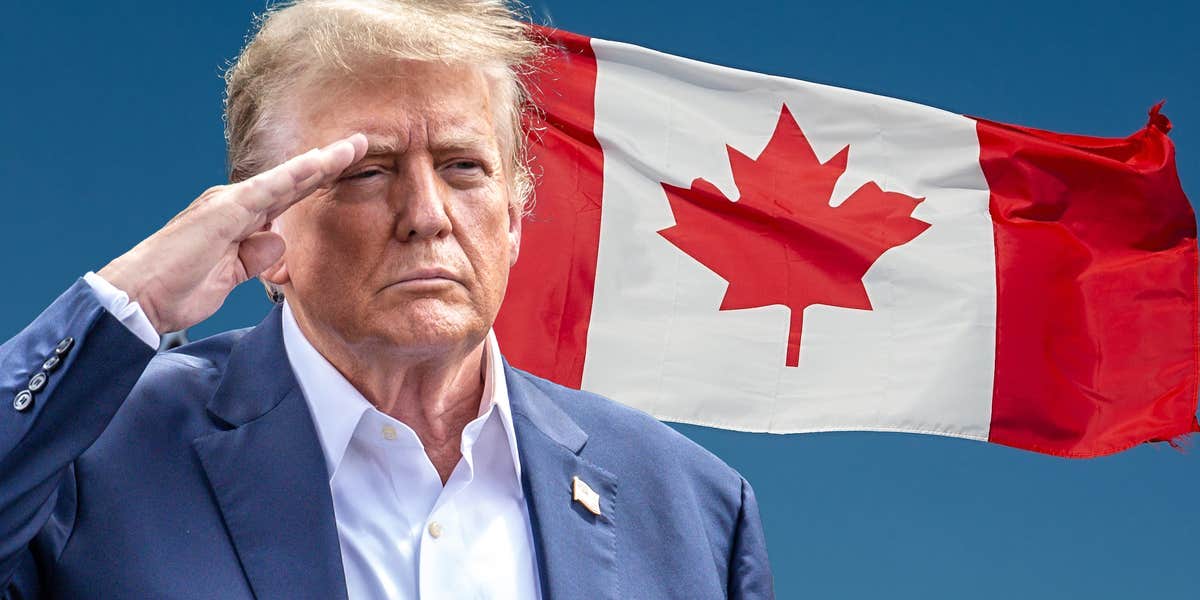Trump And Canada: Deconstructing The 51st State Claim

Table of Contents
Historical Context: Examining US-Canada Relations Before Trump
US-Canada relations have historically been characterized by a unique blend of cooperation and competition. While geographically close and culturally intertwined, the two nations have navigated a complex relationship shaped by shared history and divergent interests. The generally positive and cooperative nature of this relationship, however, often overshadows instances of friction.
- Key Agreements and Collaborations: The North American Free Trade Agreement (NAFTA), later replaced by the United States-Mexico-Canada Agreement (USMCA), stands as a testament to significant economic integration. Numerous other collaborative efforts exist in areas such as defense, environmental protection, and cross-border security.
- Instances of Friction: Trade disputes, particularly around softwood lumber and dairy products, have periodically strained relations. Differences in policy approaches to issues like environmental regulations and energy have also created points of contention.
- Unique Border and Shared History: The longest undefended border in the world reflects a unique level of trust and cooperation, a stark contrast to the relationship between many other nations. The shared history, from the War of 1812 to the cooperative management of shared resources, forms the bedrock of this unique bond.
Trump's Statements and Actions Regarding Canada: A Detailed Analysis
During his presidency, Donald Trump frequently expressed views on Canada that deviated significantly from the generally positive historical narrative. His rhetoric, often delivered via social media, frequently questioned the fairness of trade deals and the nature of the relationship itself.
- Specific Trade Disputes and Comments: Trump's frequent criticisms of NAFTA, his threats of tariffs on Canadian goods (particularly steel and aluminum), and his general characterization of trade with Canada as "unfair" fueled tensions. He often pointed to the US trade deficit with Canada as evidence of an imbalance.
- Rhetoric Related to Canadian Immigration: Trump's stance on immigration, often characterized by stricter border controls and stricter immigration policies, indirectly impacted Canada-US relations, as it affected the flow of people and goods between the two countries.
- Use of Social Media: Trump's use of Twitter to express his opinions on Canada, often in blunt and provocative language, added to the sense of unpredictability and tension in the relationship. These pronouncements often lacked the nuance and diplomatic language typically associated with high-level international relations.
Economic Implications of the "51st State" Claim
The idea of Canada becoming the 51st state carries profound economic implications. The immediate and long-term effects on both countries would be substantial and likely disruptive.
- Impact on Trade Agreements and Tariffs: The very foundation of USMCA and other bilateral trade agreements would be thrown into disarray. The removal of tariffs and trade barriers would be replaced by internal economic management policies, potentially leading to unforeseen complexities.
- Potential Disruptions to Supply Chains: The integration of Canada's economy into the US system would cause significant disruptions to established supply chains. This would impact various sectors, from agriculture and manufacturing to energy and technology.
- Effects on Canadian Sovereignty and Economic Independence: The loss of economic sovereignty and independence would have far-reaching consequences for Canada. Control over economic policy and resource management would be significantly diminished.
Political and Constitutional Feasibility of Annexation
The notion of Canada's annexation by the United States is simply not feasible, considering the significant political and constitutional obstacles.
- Canadian Public Opinion and Resistance to Annexation: The idea of becoming a US state enjoys virtually no support within Canada. Canadian national identity is strong, and the prospect of losing sovereignty is highly unpopular.
- The Legal and Constitutional Framework of Both Countries: Both the Canadian and US constitutions would need to be fundamentally altered to accommodate such a dramatic shift. The legal processes required are exceptionally complex and unlikely to be achieved.
- The Role of International Law and Treaties: International law, including existing agreements between Canada and other countries, would be violated by such a move. It would set a precedent for unilateral annexation that would have far-reaching global implications.
The Lasting Impact of Trump's Rhetoric on US-Canada Relations
Trump's rhetoric undoubtedly left a mark on US-Canada relations. While the immediate damage may have been mitigated by subsequent administrations, the legacy of uncertainty and distrust remains.
- The Current State of US-Canada Relations: While the relationship has normalized somewhat since Trump's departure, the lingering effects of his rhetoric are still evident in areas such as trade negotiations and security collaborations.
- Changes in Public Perception of Each Country: Trump's words fostered skepticism and distrust among some Canadians regarding the US, while certain Americans may harbor misconceptions about Canada due to the rhetoric of the previous administration.
- The Ongoing Dialogue and Cooperation: Despite the challenges, ongoing dialogue and cooperation remain crucial to navigating the complexities of the US-Canada relationship. Open communication and a commitment to mutual respect are paramount to rebuilding and strengthening the relationship.
Conclusion
The claim of Canada becoming the 51st state, fueled by Donald Trump's rhetoric, is ultimately untenable. Historical context, economic realities, constitutional barriers, and political considerations all render the idea impractical and inappropriate. Trump's pronouncements, while impactful, do not negate the deep-seated historical ties and mutual benefits of a strong US-Canada relationship. We urge readers to further investigate the complexities of US-Canada relations and learn more about the realities of the Trump administration's approach to Canada. Seek reliable sources to avoid misinformation and promote informed discussions about this crucial bilateral relationship. Continue to explore the complexities of "Trump and Canada" to promote a better understanding of international relations.

Featured Posts
-
 Jay Z Shares Super Bowl Moment With Daughters Blue Ivy And Rumi
Apr 30, 2025
Jay Z Shares Super Bowl Moment With Daughters Blue Ivy And Rumi
Apr 30, 2025 -
 Panoramas Chris Kaba Episode Independent Office For Police Conduct Iopc Complaint To Ofcom
Apr 30, 2025
Panoramas Chris Kaba Episode Independent Office For Police Conduct Iopc Complaint To Ofcom
Apr 30, 2025 -
 Bayern Munich Af D Politician On Board Unthinkable Says President
Apr 30, 2025
Bayern Munich Af D Politician On Board Unthinkable Says President
Apr 30, 2025 -
 Essential Wayne Gretzky Fast Facts For Hockey Fans
Apr 30, 2025
Essential Wayne Gretzky Fast Facts For Hockey Fans
Apr 30, 2025 -
 Goeruenmez Tehlike Nevsehir De Yueksekten Duesme Kazasi
Apr 30, 2025
Goeruenmez Tehlike Nevsehir De Yueksekten Duesme Kazasi
Apr 30, 2025
